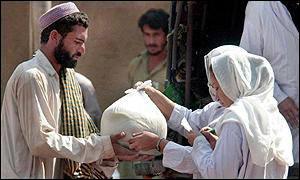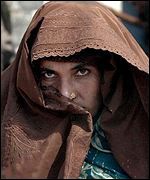Afghanistan's clandestine army
Until recently RAWA received little media attention
The renewed media interest in Afghanistan in the wake of the bombings in Washington and New York has focused attention on RAWA - the Revolutionary Association of the Women of Afghanistan.
It is based just inside Pakistan in the border town of Quetta. Its members are regularly photographed distributing aid and medicine among the swollen refugee camps.
They wear the concealing clothing that is obligatory for all women who wish to move in safety in this part of the world - but this is not a reflection of their beliefs or piety.
Behjat, who works in RAWA's media office, says she would like to see a government in Afghanistan that is 100 per cent secular.
"We believe that's what the Afghan people want. We don't want anyone to impose their beliefs or religion on anyone else."
RAWA runs classes for Afghan women, only 5 per cent of whom can readIntellectual origins
RAWA was set up in Kabul in 1977 as a movement of women intellectuals with the aim of increasing women's representation in politics and society and promoting a secular democratic society.
That is still its long-term aim, but deteriorating conditions inside Afghanistan have forced the movement to shift its focus to more practical matters such as healthcare and education.
As a condition of membership RAWA members are also obliged to act as witnesses and record what is going on inside the country.
It is dangerous work and many RAWA supporters have been killed.
Secret witness
One of its greatest media coups was smuggling out a video cassette showing a summary execution carried out by the Taleban in a stadium in Kabul.
The video was shot by a RAWA member who hid the video recorder under her burqa - the long veiled garment that all Afghan women are obliged to wear in public places. It shows a horrifying scene.
A man with a microphone is pictured reading from the Koran. One of three women, accused of adultery, is then led to the centre of the stadium where a man puts a gun to her head and shoots her.
Behjat welcomes the increase in media attention, but says it has not so far led to any increase in support or funding for the organisation.
RAWA has even received hate mail from those who equate all Afghans with the atrocities committed against the US. But she says the overwhelming majority have been supportive.
Dedicated membership
Like Behjat, many members of RAWA are from what once made up the educated middle classes.
Behjat moved with her family to Pakistan from Kabul 13 years ago and was educated at one of two secondary schools run by RAWA in Quetta.
Her mother was a member of the organisation and Behjat gave up the chance to go to university to work full time for RAWA.
But the membership has grown to include many women who learnt to read through RAWA's clandestine literacy classes inside Afghanistan.
Those who have benefited from these classes now form some of the organisation's most active and dedicated members.
But, understandably, morale inside Afghanistan is not good.
No news
RAWA has hundreds of members inside the country who are still carrying out their work running literacy classes and offering basic healthcare services.
But since the borders were closed there has been no news of them.
Until recently, people made contact by relaying messages via people coming across the border, but this is no longer possible.
Behjat believes that if the United States leads an attack on Afghanistan it will be "another catastrophe for the country".
But she is hopeful that the current situation will eventually lead to a change of regime.
In the meantime, RAWA is looking into ways of expanding its membership to include the vast numbers of supporters who would like to help, but are not able to make the sacrifices required of the current membership.
Behjat believes most Afghans share RAWA's basic aims: "We want a peaceful country where people can express their beliefs and feelings without fear."
RAWA has stated that it would support the return of the exiled King Zahir Shah.
His 40 year rule which ended in 1973 "though unremarkable, was one in which at least the people did not suffer", says Behjat.
From: http://news.bbc.co.uk/hi/english/world/south_asia/newsid_1562000/1562596.stm
Afghan feminists go online (BBC News, Mar.23, 2001)

